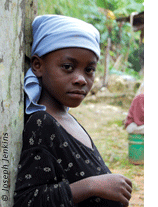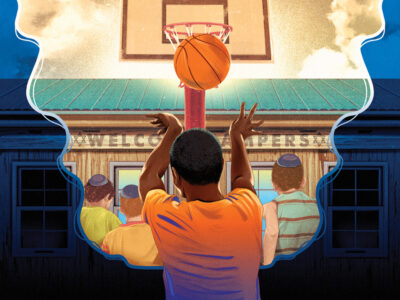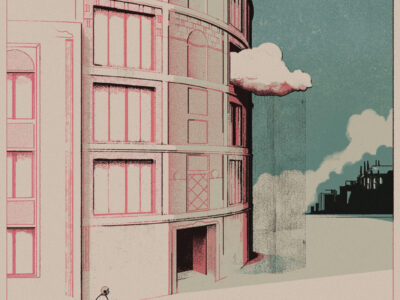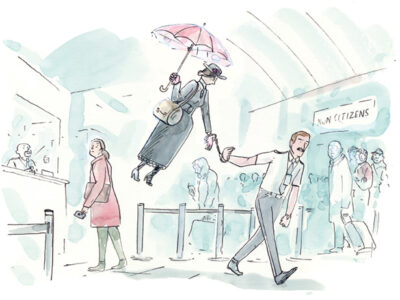
Three memories of Haiti.
By Joseph Jenkins
“I would invite you in,” the priestess says in Creole, “but I have no house.”
We stand on the stone forecourt of what once had been quite an imposing dwelling, now little more than a propped up roof. The priestess takes my hand and squeezes hard; soft, gentle eyes, warm smile.
Walking the hills near the new school construction project, we breathlessly visit house after house wrecked by the earthquake. Much is offered to us: gifts of succulent sugarcane later placed in amber rum, tiny chilies that fry the unprepared palate, and everyone wants to show us their home. Most roofs have been restored, more or less. However, walls are a rarity, making the nightmare possibility of a hurricane hang in the air. This year, a threat to more than the planting of the summer beans.
A cursed tree, a wreck from a bolt; our guide warns us not to touch, or worse yet, take from it, or imminent death is certain. An old woman sits on its roots anyway. Her jaw set, arms folded, she says nothing, and everything. As if to say, “Do your worst, I fear not. What can death bring me that I haven’t got already?” She is a regular laborer at our work site, the one who tears the shovel out of the men’s hands if they take too long to fill her bucket with dirt. Sometimes she dances while she waits, in a way that makes everyone, including me, forget how old she is.
And yet, almost everybody smiles. I know many of them, and they all seem to know me. “Blancs” are quite a novelty in these parts, as is help. They greet me with “Bonjoo,” Creole style, or “Ça va” with a gravity that I had not previously associated with that phrase.
One more house. It’s never one more house. This is not a house, there’s not even a tarp. Surely this is a pile of wreckage, long derelict. A hand emerges. How can anybody fit in there? A visiting colleague turns away, bursting into an accumulation of held back tears. Out comes a very elderly and spindly man, dressed immaculately, as though he is off to give a sermon. He gives us chilies.

Daily howls, daily pleading—a peripheral streak dragging a struggling little body behind an outbuilding; violent events obscured from the eye but not from the gut. What my ancestors have wrought on Haiti, I think, but I know that this is what poverty has wrought everywhere. This home has eight people, most of them children, living in what’s left of a roof, no higher than a kitchen counter.
And then it happens in full view—visible now, but no more decipherable. A worker leaps from the trench and grabs a branch, expertly shearing off the leaves in a stroke. Blows from the shrieking stick cut the air, flesh, the side of the head, flailing howling arms, a little body, maybe five years old, far younger than my youngest daughter.
A miraculous breakaway, a threatening pursuit.
“No!” I hear myself shouting automatically.
The laughing crowd turns to me with looks of, “Isn’t this fun?”
I scream “No! Ce n’est pas bien!” My French pathetic, my Creole practically non-existent, my translator at breakfast, I feel powerless. Another child scrambles up a tree. His pursuer, unable to follow, shakes it violently. His big hand waves the stick in the air.
I cry out. The crowd turns to me, wanting to share their delight in the sport. The pursuit ends, and work resumes. I storm off impotently to one of the few fully repaired homes, a place where I have stayed, wondering what to do. Madame Maurice’s elegant kind face listens passionately to my tirade. My English is not understood but my tone is. She tries hard to understand. She is very upset. I am shrill like a desperate child. My blood boils. “This will stop! And it will stop now or I am going home!”
My crew is in a state of shock when I come back down to the work site after spending more than an hour trying to cool off. Nothing here, it seems, is ever said or done in isolation. A translation has carried quickly. “Mr. Joe—you go?” This new seismic-resistant school, which will replace the old one racked to rubble by the earthquake, means so much to all of them and to me. It may well be all that is left standing if a hurricane, or worse, hits. They watch me closely, silent and still, like the first time they saw me put on sunblock. All work had spontaneously stopped. “Look, he is making himself even whiter!” I had rolled up my sleeve to show them what the soleil does to “blancs.” There was startled belly laughter then, but not now.
“You are all good people and your children love you very much. And by the way, so do I.” I have truly come to. “You are much much better than what I saw today. Nah weh dumee,” I say. See you tomorrow.
They applaud warmly before the translation even begins.
I walk alone up the steep hill to my newly built little house, the one they built quickly (and magnificently) for my arrival. Tears of helpless rage well up. Poverty, collapse, and empty-belly stress surround me—in every household, without exception.
These particular beaten children of the earthquake have no parents, except in jail.

You couldn’t help but notice her, quietly awaiting her turn to carry away some dirt on her head. Striking, poised, no shoes.
She can’t be more than 12, why isn’t she in school?
“She can not read,” is the reply. “She cares for her grandmother. Her mother ignores her and lives far down the mountain. No one knows where her father has gone.”
All the girls seem to work up here. At least most of them go to school. But you hardly ever see them play, unlike the boys.
She comes back every morning, one of the first to arrive. She needs money badly. Her home has little land for crops, although they do have a banana tree, some papaya, and a coffee plant. I make sure that she is hired, every day. I sometimes sneak a little of my breakfast to her. The cook notices, disapproving but saying nothing. Intentions between an older man and a young girl can so easily be misunderstood, especially in these circumstances. The entire community notices, and starts to talk.
One day, we pass by her house clinging to a steep hillside and she comes running out. I didn’t know that she could smile. Kissing us on both cheeks, she asks us in. A charcoal fire burns in a decrepit outbuilding: the day’s only meal floats in some boiling water, hardly enough for one person. Her nearly blind grandmother eerily emerges from the darkness of their shattered little house.
They are both clearly fond of me and give me some bananas wrapped in a beautiful scarf.
Weeks later, it is time for me to go home. She tries to hide the tears streaming down her face, but they are already on mine. I ask her to stomp her foot on a piece of paper—a big flat foot, an alligator-skinned stranger to shoes. I plan to change that, along with some other things.
Joe Jenkins GAr’93 researches sensitive and efficient construction techniques for extreme low-income communities and those in need of disaster relief. In July of 2010, working in cooperation with World Connect and The World Leadership School, he designed, located suitable building materials (more difficult than you might think), and established the foundations for two new seismic resistant school buildings in La Fond, Haiti.




